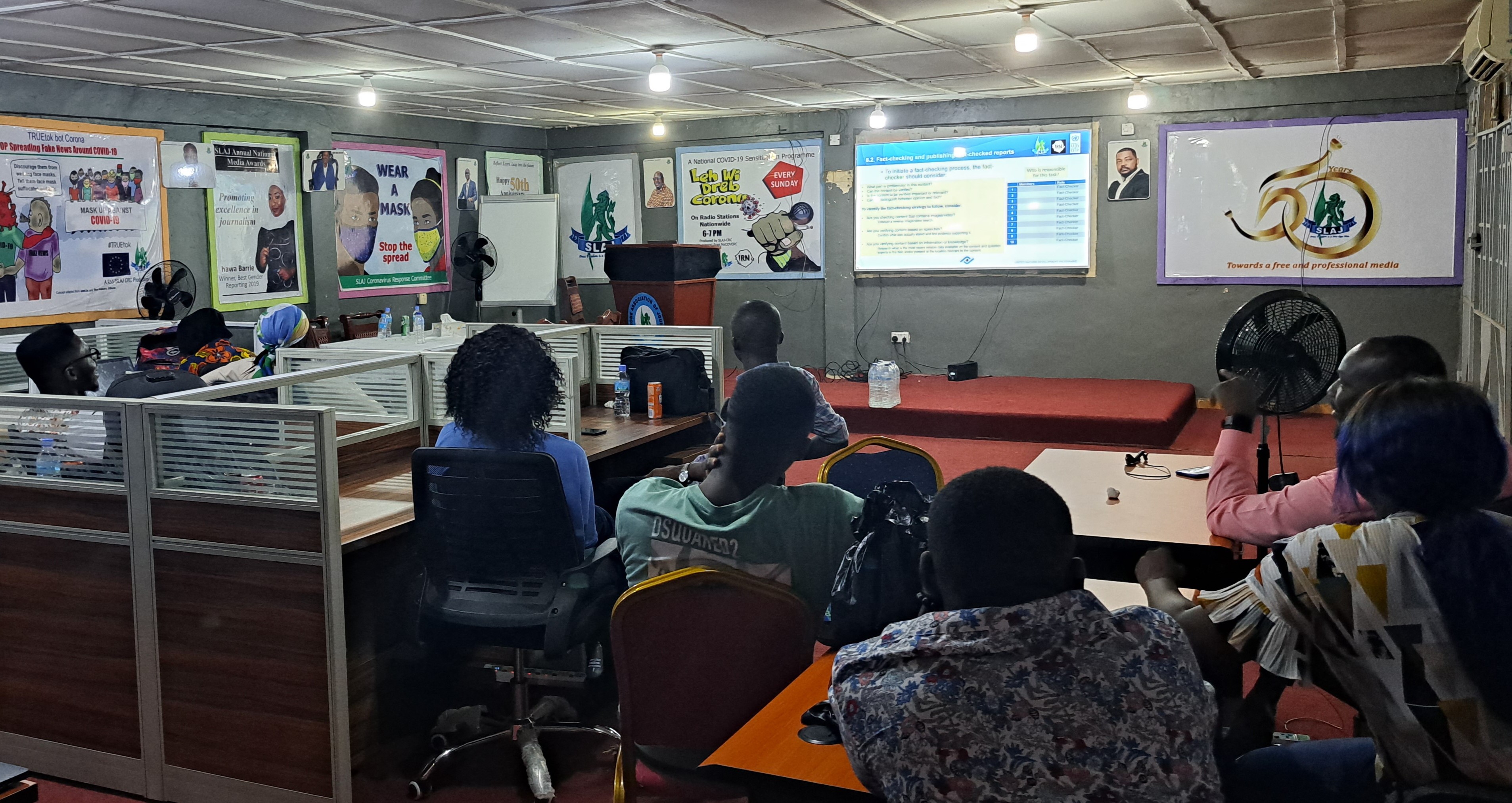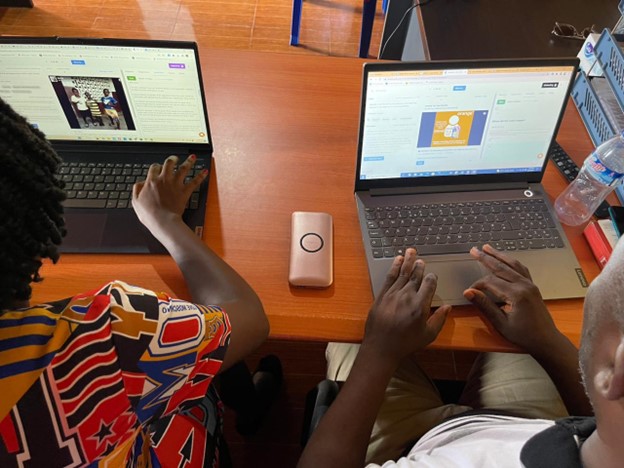iVerify platform combines human skill and technology to check the facts ahead of elections in Sierra Leone
Debunking disinformation
June 6, 2023

Misinformation, which includes disinformation and hate speech, poses a significant threat to democracies worldwide. Sierra Leone has launched iVerify to fight information pollution ahead of elections.
Ahead of the country’s June 2023 general elections, the Sierra Leone Association of Journalists (SLAJ) and the Independent Radio Network (IRN), in partnership with BBC Media Action, have launched the iVerify platform, to strengthen national capacity to proactively identify and respond to misinformation, disinformation and hate speech. As one of a range of interventions, it can help support a healthy information ecosystem.
What is the value of trusted and verified information? It supports a fair electoral process and a path to a sustainable future. Misinformation, which includes disinformation and hate speech, poses a significant threat to democracies worldwide. It has the potential to disrupt peace and security, with the most vulnerable often being disproportionately affected.
In Sierra Leone, the majority of people – almost three-quarters – don't have internet access. Instead, they rely on the radio for information.
“In Sierra Leone today, radio is still the medium with the largest audience. Over 70 percent of the country’s population continues to listen to the radio for information. Although social media platforms are making waves, users still make up only about 10 percent of the country’s population. In this context, a platform like iVerify will not gain traction if it is not popularized on the radio. The radio will drive the traffic to the platform,” says Ransford Wright, National Coordinator of the Independent Radio Network.
The Independent Radio Network of Sierra Leone currently hosts a weekly radio programme with verified elections-related and voter education content. With a team of eight fact checkers and two coordinators working under the leadership of the Sierra Leone Association of Journalists (SLAJ), potential problematic content circulating in the country is verified, and evidence is published on the publicly available website: Separating truth from fiction for breaking news in Sierra Leone.

Since the launch of the platform in Sierra Leone, the iVerify team (here attending a briefing session) have successfully processed 40 fact-checking requests.
“This is the first time we are using the iVerify platform, and it is proving to be critical to the June 2023 national elections in terms of providing citizens, as well as journalists, access to reliable and credible information. Citizens need verified and trusted information to make informed decision and choices in the elections,” says Ahmed Sahid Nasrallah, President of the Sierra Leone Association of Journalists.
The public can request for stories to be fact-checked by the team, sharing any type of content ranging from an article to a video or picture via the dedicated tiplines set up through WhatsApp, Facebook Messenger and Twitter.
Leveraging the capabilities of artificial intelligence, potentially false or harmful content is flagged for verification by the team. Following a fact-check, the results are shared not only with those who requested the verification but also with all other Sierra Leoneans who visit the website and social media channels.
BBC Media Action, a partner in this initiative, provides support to the iVerify initiative by leading research and learning activities. Additionally, it produces social media content aimed at fostering media literacy and heightening awareness of mis- and disinformation.
The technical support for this fact-checking tool is provided by UNDP’s electoral support team and its Chief Digital Office, with financial support from UNDP, the UN Peacebuilding Fund, Ireland, the European Union, Canada and Iceland.
"Citizens need verified and trusted information to make informed decision and choices in the elections."Ahmed Sahid Nasrallah, President of the Sierra Leone Association of Journalists
“The pros of my job outweigh the cons. With iVerify, the people of Sierra Leone now have a way out of the gamut of misinformation that has been plaguing the country for quite too long. Politicians have become used to telling lies. With iVerify up and running, most of them will think twice. iVerify keeps them on their toes, they must be plain and truthful to their electorate,” says “Peter”, who did not want to use his real name. Previously a broadcast journalist in the country, Peter is now coordinator of the iVerify platform.
“There is a bit of concern about security, but that is part of being a journalist,” Peter says. “You receive threats, but you must stay true to the cause, which is to check facts and tell nothing but the truth. I see no better time than now to do this, especially as we are approaching the general elections. This is a time when a lot of fake news is being peddled online and offline as confirmed by recent research by the Media Reform Coordination Group (an accountability organization that supports journalists), which found out that Facebook and WhatsApp are the most popular platforms to spread misinformation.”

UNDP has also launched iVerify in Liberia to help combat hate speech and disinformation in the lead up to general elections in October 2023.
In partnership with the Local Voices Liberia network of journalists, UNDP has also launched iVerify as part of the Liberia Electoral Support Project to help combat hate speech and disinformation in the lead up to the Liberian general elections in October 2023. A team of 15 fact-checkers have completed training and travelled to all 15 counties of the country, to ensure accuracy and reliability in places where misinformation is likely to emerge.
“The iVerify platform has eased the difficulty of conducting fact-checking. It helps blend our human fact-checking skill with the use of technology to counter disinformation and hate speech. We are now able to track and fact-check claims within a short time,” said Alpha Daffae Senkpeni, Local Voices Liberia’s Executive Director.
The initiative has the support of the Ministry of Information, Cultural Affairs and Tourism, National Election Commission, Embassy of Ireland, Embassy of Sweden, Internews and civil society organizations.
In 2021, the iVerify was piloted in Zambia, ahead of the historic August 2021 elections, which helped to build the credibility of the fact-checkers in the context of the national information landscape. Through iVerify, content producers removed false information from media outlets, preventing hate speech and misinformation. Kenya and Honduras also relied on iVerify during elections to provide trusted and valuable information to the local population.
In 2022, iVerify was added to the registry of the Digital Public Goods Alliance. Digital public goods (DPGs) are open source digital solutions available across national borders everywhere, to all countries and people for free. Being a DPG, allows for iVerify’s cost-effective replication and adaptation to meet local needs. Moreover, the process of setting it up and making it work can boost the skills and knowledge of local tech communities. So, this approach is not only more affordable compared to licensed solutions but also helps grow local digital know-how and networks.
The iVerify platform is a joint initiative from the European Commission and UNDP. It is in this context of the partnership and strong commitment of both organizations to fight information pollution that iVerify first came to life. The European Union and UNDP are the two largest electoral assistance providers globally, and their partnership on electoral support is formalized through a Joint Task Force to facilitate coordination. Since 2006, the EU and UNDP have worked together in over 200 electoral assistance projects in more than 100 countries, amounting to over 1.3 billion Euros.
For more information on iVerify and its implementation, contact be.jtf.team@undp.org

 Locations
Locations



